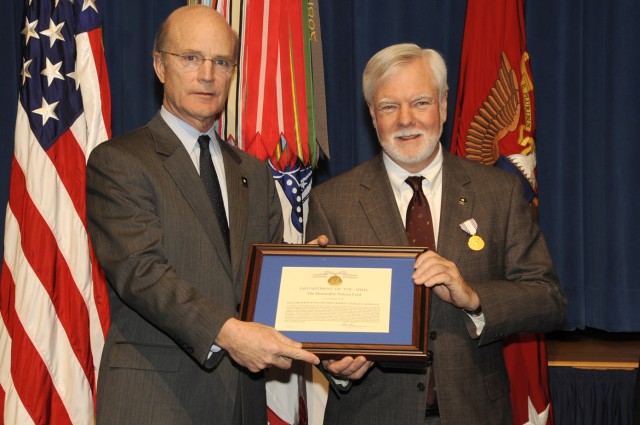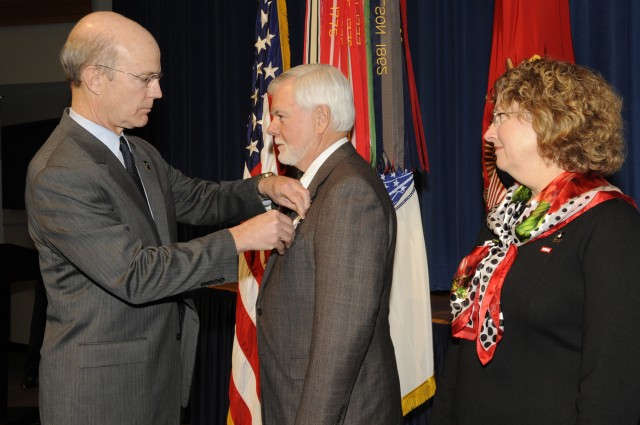Excerpt from Mr. Nelson Ford's Farewell Address-As Delivered
Pentagon Auditorium
January 5, 2009
"I couldn't get away without offering a few thoughts about money and people. Our job is readiness-generating manned, trained and equipped units for combatant commanders to use in protecting and defending our national interests. This is a difficult job that requires much care in balancing competing interests. Combatant commanders always want more readiness; taxpayers think that they can get by with less.
"You are all familiar with the slide that shows the sharp changes in defense spending since World War II [attached]. It is a dramatic sine wave. Most of you have heard me describe the reductions in Army spending that followed every war for the last 230 years. History suggests that, despite our best efforts to explain the Army's need for future expansion in its base funding, reductions will happen again and probably soon. That means that if we are going to avoid the next hollow army, we need to start now figuring out how to do more with less.
"This is not impossible. I know it feels impossible to most people in the Army (we always have a list of UFRs [unfunded requirements] that we think somebody ought to fund), but American businesses figured out how to do more with less in the 1980s. And what they figured out is that you can be both more effective and more efficient at the same time.
"The Secretary and the Chief have launched the Enterprise Task Force (ETF), which, I believe, will help the Army explore how to adapt our institution to the coming fiscal challenge. From my perspective, the key test for the ETF is not in designing the new wiring diagram for the reorganization; it is to figure out what effects we are trying to achieve and how to measure our ability to achieve them.
"Let me give you an example: we all know that the modular BCTs are more effective than legacy brigades. But, how much more effective' If we knew how much more effective they were, would that change our calculus about how many of them we need'
"I don't know the answers to this question, but it is the kind of question I think we need to be asking in the future.
"The reason that understanding effects are so important is that for the Army, effectiveness is the gold standard, not efficiency. In any case, you can't be more efficient until you understand what your effectiveness measures are-what it is you're trying to do.
"This exercise will lead inevitably to the conclusion that the Army has more mission than money and cause us to make some tough choices. Tough choices are never easy, but they are inevitable. The question I leave you with is this-in a dangerous world, in an era of persistent engagement, when we are unlikely to have a year or two to get ready to respond, how can we sustain our readiness'
"There are likely to be things that we are attached to that we will have to forego and there will be some jobs that we just won't be able to do. Now, I know that "no" is not an Army value, and I'm not trying to change that now. But let me suggest that when someone comes up with the next great task that they want to give the Army, we temper "yes" with some qualifiers, like "if", or "but", or "when." I know this will be hard at first, but if we know what effects we are trying to achieve and we know how much money it takes to achieve each one, then we will be standing on a firm foundation-not sand-when these foreign words cross our lips.
"The alternative is an army with too much to do and not enough money to succeed. We've had that experience before.
"Finally, let me talk a little bit about our people. We have the best Army in the world, perhaps one of the best in history. Our Soldiers are all volunteers and they understand the values they are fighting for. We have been operating at a very high OPTEMPO for seven years and, while we are strong, we are tired. You can see it in the eyes of the sergeants in Afghanistan (I had dinner with about twenty of them the night before Thanksgiving) and you can see in the 3rd ID Soldiers who are getting ready to go again (a similar size group at Fort Stewart in December).
"They are committed to their missions; their resolve is strong. But whether they are deployed or preparing for the next one, they do want to know when the pace will subside. They are not robot soldiers ([John] Pike had an interesting Op-ed in the [Washington] Post yesterday about robot soldiers). They bleed and break like the rest of us, but they are much tougher. As we begin to do conditions-based assessments of our equipment, we also need to figure out how to do conditions-based assessments of our Soldiers.
"We need to understand not only the cumulative effects of seeing combat, of seeing your friends killed and wounded over multiple deployments, but also the stress of eighteen hour days for months on end, of eating with a weapon in your lap, of missed birthdays and holidays. In short, we need to know the cost on the minds and bodies of our Soldiers.
"Our sister services have established relatively short deployment lengths, which they protect vigorously. Our deployments are longer and their length seems more flexible. We know how long it takes to reset an M1 tank, but we don't know how long it takes to get a Soldier physically and psychologically ready for the next mission.
"Let me suggest a NASCAR example to reinforce [the importance of this issue]. The reason for a red line on an engine's tachometer is to let you know when you are damaging the engine. Usually, the engine doesn't fail the first time it crosses the red line, but if you continue to rev it too high, it will fail eventually. The Army's strength is in its people. They are our most precious and most expensive asset. If we're going to continue to meet the nation's expectations, if we're going to keep rolling along, we need to watch those red lines carefully."




Social Sharing